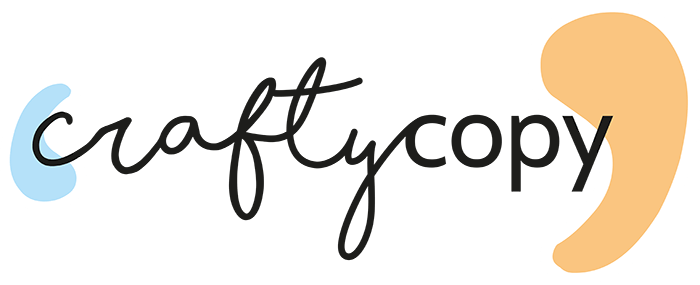WORST Copywriting Mistakes When Writing About Your Business
“Copywriting mistakes? Pff, puh-lease. Writing about my own business is easy.”
“Peace of cake.”
“After all, I’m the one who knows it better than anyone else.”
Well, not to rain on your charade, but that’s... exactly the problem.
5 copywriting mistakes you’re probably making if you write about your own business
As a website copywriter & brand messaging strategist, I have a superpower: whenever I bump into a business website, I can immediately tell whether it was written by a professional copywriter or the founder (or a cheap UpWork writer).
Here are the copywriting mistakes I’ve encountered the most.
And we’re not talking about being petty with grammar: this is stuff that can (and probably already is) cost your business money by making you miss out on sales.
1. Making your marketing materials all about yourself
Well, it’s my business website, blog, and social media: of course they should be about myself, right?
I mean, sure: they’re there to promote your business.
But the focus of your brand message shouldn’t be on your company: it should be on your target audience.
A popular copywriting mistake is to make them extremely corporate and bore your leads with information they don’t actually care about.
For example, ‘we’re a company with twenty years of experience in the tech industry. We’re passionate about what we do. Our values are…’ blah, blah, blah.
“Tell your customers how your products or services will benefit them!”
Paint a picture of how confident/happy/enthusiastic/relaxed they will feel once they invest in them.
Position your business as the helpful guide that will solve their current pain point: not the hero.
Your customers are.
#soz
(#NotReally)
2. Thinking your audience cares about the same things you do
Let me know if any of these sound familiar:
“We’re delighted to announce that we’ve just been nominated for…”
“Read our new blog post to see how we’ve adapted to…”
“We’re proud to announce that we now stock…”
BO-RING.
Ok, I’ll try and be more tactful about it, because I actually do get it.
It’s your business. You freakin’ love what you do. So you expect everyone else to care about the same things: your awards, announcements, and company news, right?
Unfortunately, they don’t (except for your supporting relatives and best friends).
“They care about stuff that benefits them, educates them, entertains them, or brings them value in one way or another.”
In some cases, you might have to rethink your content strategy altogether (e.g. start posting blogs that answer your audience’s questions about your industry, not company news).
In some others, it might be more about changing the focus of what you were already planning on posting (e.g. don’t say “we have new dungarees in stock”. Go for something like “Get ready to remix outfits like a pro. Here are five different looks that you can achieve with one pair of our dungarees”).
3. Taking too many things for granted
Another one of the most common copywriting mistakes that people make when writing about their own business is that they don’t realise how much they’re taking for granted, both when it comes to their industry and their actual brand.
What steps should your leads take in order to invest in you? What can they expect once they do? How will this benefit them in practice? What does that acronym stand for?
“These are all things that you might think are obvious, but… well, of course, they are, when you’ve been running your own business or working in a specific industry for years.”
But what if you’re just reading about it for the first time? What if you don’t know much about the industry itself as you’re only there to have your problem fixed?
You’d just be really confused and most certainly not compelled to invest in something you’re not fully understanding.
4. Using jargon, buzzwords, or (boring) corporate language
This copywriting mistake is actually the direct consequence of the previous three: if you make your marketing all about yourself, don’t understand your audience and take stuff for granted, you’re going to write copy that doesn’t connect with your readers.
This can involve:
Complicated jargon that immediately confuses them and puts them off
Overused buzzwords that become white noise to your audience (e.g. cutting-edge solutions)
Corporate-sounding language that bores them to death (e.g. “our company values are....”)
Don’t forget that your customers are human (yes, even in B2B marketing) and aren’t up for deciphering your essay-style text.
Speak their language instead of sounding like a robot.
5. Writing without a strategy in mind
“Writing about my business is easy.”
“It’s just words to fill up a website and tell our potential customers about what we do.”
“Anyone can do it.”
“In fact, I used to be pretty good at English.”
Well, no.
To you, they might look just like ‘words on a page’, but there’s actually a lot more behind professional copywriting.
Do you think that anyone could have come up with “just do it” or the “maybe your second car shouldn’t be a car” (my favourite Vespa ad)?
No.
“Pretty words don’t sell. Words written with the right strategy do.”
Marketing copy should always be crafted with a strategy in mind, helping a cold lead warm up, and tapping into the right psychological techniques to leverage their pain points, agitate them, and offer an unmissable solution.
To give you an idea, here are some of the things that I do before I actually write a single word:
I ask you all the right questions through my project planner and spend some time analysing them, familiarising myself with your brand
I understand your audience: what they care about, how your products or services would actually benefit them, what objections they might have, etc.
I look at your competitors’ websites to figure out what gaps we need to fill and how I can make you stand out
I find the right keywords to help you rank higher on Google, generating more organic leads when your audience looks for the type of products or services you sell
How working with a professional writer will bypass (or fix) these copywriting mistakes 🙌
I know some business owners are reluctant to work with a copywriter because they’re afraid they won’t “get” their brand.
Here’s the thing, though: we don’t just get it. We help your audience get it, too
We make them the focus of your marketing materials while showing them why you are the perfect solution for them
We understand what they actually care about: instead of stroking your ego (sorry!), we create content that keeps them interested
We don’t take anything for granted because we’re also hearing about your business for the first time… just like your audience
We HATE jargon, buzzwords, and corporate-sounding sentences. We write in a way that gets your audience’s attention and retains it
And, finally, we write your copy with a strategy in place, optimising it for conversions, UX, and—in most cases—SEO
Now that you know about them, did you spot any of these copywriting mistakes in your marketing copy? I can help!
I’m Giada, and I specialise in taking women entrepreneurs from “just another option in their niche” to “THE go-to solution for their ideal clients.”
Receive some spanking new website copy that actually generates leads and sales or strategic blog posts to grow your audience.
More #crafty blog posts on this topic:








